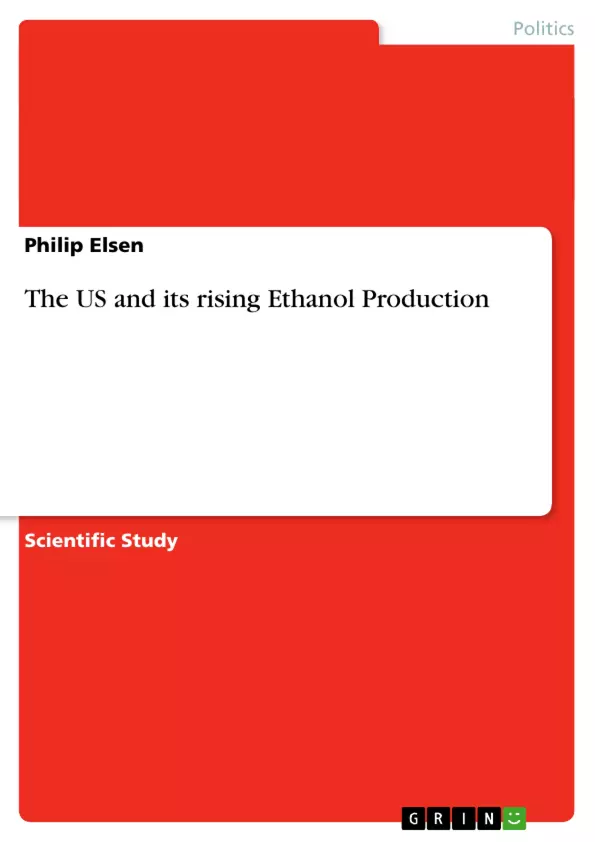The US and its rising Ethanol Production
Abstract:
In the 2007 State of the Union address,1 US President Bush called on the country to produce 35 billion gallons of biofuel a year by 2017. President Bush’s proposal to increase biofuel production will dramatically increase the volume of corn required by the US ethanol industry and will translate into higher prices for both processed and stable foods around the world. Consequently, corn-based ethanol will continue to tie oil and food prices together in ways that will profoundly upset the relationship between food producers and consumers, with potentially devastating implications for global poverty. In addition, it will only replace a small percentage of US fuel consumption.
ANALYSIS:
1. The US Ethanol Market
2. Impacts for the US and world Agriculture
3. Increased US corn (food) prices and its effects
4. US Ethanol production- dependence oil and environmental benefits
5. Conclusion
Inhaltsverzeichnis (Table of Contents)
- EVENT: The US and its rising Ethanol Production
- SIGNIFICANCE
- ANALYSIS: The US Ethanol Market
- Impacts for the US and world Agriculture
- Increased US corn (food) prices and its effects
- US Ethanol production- dependence oil and environmental benefits
- CONCLUSION
Zielsetzung und Themenschwerpunkte (Objectives and Key Themes)
This document examines the implications of President Bush's 2007 proposal to increase biofuel production in the United States, focusing specifically on corn-based ethanol. The document analyzes the impact of this policy on global food prices, energy dependence, and the environment.- Rising ethanol production and its effect on corn prices
- The impact of increased corn prices on global food security, particularly in developing countries
- The role of government subsidies and tariffs in promoting ethanol production
- The environmental implications of corn-based ethanol production
- The relationship between ethanol production and energy independence
Zusammenfassung der Kapitel (Chapter Summaries)
- The text begins by outlining President Bush's 2007 proposal to increase biofuel production to 35 billion gallons per year by 2017. The proposal is analyzed in terms of its significance for the global food market, particularly the impact on corn prices.
- The document then explores the history of US ethanol production, highlighting the role of government support and the recent surge in production driven by rising oil prices. The analysis focuses on the impact of increased corn use for ethanol production on US and global agriculture.
- The text further explores the implications of increased corn prices for consumers, especially in developing countries. The impact on livestock producers and the potential for food insecurity are discussed.
- The document also examines the relationship between ethanol production and energy independence, highlighting the challenges of dependence on oil imports and the environmental implications of corn-based ethanol.
Schlüsselwörter (Keywords)
The main keywords and focus topics of this document are: ethanol production, corn prices, global food security, energy independence, government subsidies, tariffs, environmental impact, and developing countries.Frequently Asked Questions
How did US policy impact ethanol production in 2007?
President Bush's State of the Union address called for 35 billion gallons of biofuel by 2017, significantly driving up the demand for corn-based ethanol.
What is the link between ethanol and global food prices?
Increased demand for corn to produce fuel ties oil and food prices together, leading to higher costs for stable foods and potentially devastating poverty in developing countries.
Does ethanol production ensure US energy independence?
While it aims to reduce oil imports, analysis suggests it only replaces a small percentage of total US fuel consumption and creates new dependencies on agricultural resources.
What are the environmental impacts of corn-based ethanol?
The benefits are debated; while biofuels are renewable, large-scale corn production for fuel involves significant land use, water consumption, and industrial farming emissions.
How do government subsidies affect the ethanol market?
Subsidies and tariffs have been crucial in promoting the domestic ethanol industry, making it competitive against imported fuels but also distorting agricultural markets.
- Quote paper
- Philip Elsen (Author), 2007, The US and its rising Ethanol Production, Munich, GRIN Verlag, https://www.grin.com/document/137708



